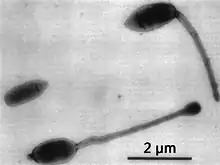| Hyphomicrobium | |
|---|---|
 | |
| Scientific classification | |
| Domain: | |
| Phylum: | |
| Class: | |
| Order: | |
| Family: | |
| Genus: | Hyphomicrobium Stutzer and Hartleb 1899[1] |
| Type species | |
| Hyphomicrobium vulgare[1] | |
| Species | |
| |
Hyphomicrobium is a genus of Gram-negative, non-spore-forming, rod-shaped bacteria from the family of Hyphomicrobiaceae.[1][2][3][4][5][6] It has a large polar or sub-polar filiform prostheca very similar to that of Caulobacter. In addition to having a nutritional function, the prostheca also plays a role in the initiation of DNA replication.
Reproduction in Hyphomicrobium begins when its hyphal filament (prostheca) grows from one end of the cell (this happens when the cell no longer has a flagellum) and the bud grows from the tip of the prostheca that eventually differentiates into a new swarmer cell.
Phylogeny
The currently accepted taxonomy is based on the List of Prokaryotic names with Standing in Nomenclature (LPSN).[1] The phylogeny is based on whole-genome analysis.[7]
| |||||||||||||||||||||||||
References
- 1 2 3 4 LPSN lpsn.dsmz.de
- ↑ UniProt
- ↑ Urakami, T.; Sasaki, J.; Suzuki, K. -I.; Komagata, K. (1995). "Characterization and Description of Hyphomicrobium denitrificans sp. nov". International Journal of Systematic Bacteriology. 45 (3): 528. doi:10.1099/00207713-45-3-528.
- ↑ Vuilleumier, S.; Nadalig, T.; Farhan Ul Haque, M.; Magdelenat, G.; Lajus, A.; Roselli, S.; Muller, E. E. L.; Gruffaz, C.; Barbe, V.; Medigue, C.; Bringel, F. (2011). "Complete Genome Sequence of the Chloromethane-Degrading Hyphomicrobium sp. Strain MC1". Journal of Bacteriology. 193 (18): 5035–6. doi:10.1128/JB.05627-11. PMC 3165642. PMID 21868803.
- ↑ Rainey, F. A.; Ward-Rainey, N.; Gliesche, C. G.; Stackebrandt, E. (1998). "Phylogenetic analysis and intrageneric structure of the genus Hyphomicrobium and the related genus Filomicrobium". International Journal of Systematic Bacteriology. 48 (3): 635–9. doi:10.1099/00207713-48-3-635. PMID 9734017.
- ↑ Characterization and Description of Hyphomicrobium denitrificans sp. nov.
- ↑ Hördt, Anton; López, Marina García; Meier-Kolthoff, Jan P.; Schleuning, Marcel; Weinhold, Lisa-Maria; Tindall, Brian J.; Gronow, Sabine; Kyrpides, Nikos C.; Woyke, Tanja; Göker, Markus (7 April 2020). "Analysis of 1,000+ Type-Strain Genomes Substantially Improves Taxonomic Classification of Alphaproteobacteria". Frontiers in Microbiology. 11: 468. doi:10.3389/fmicb.2020.00468. PMC 7179689. PMID 32373076.